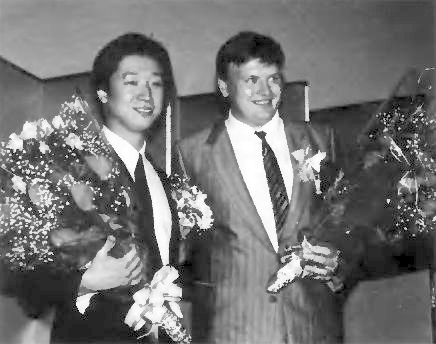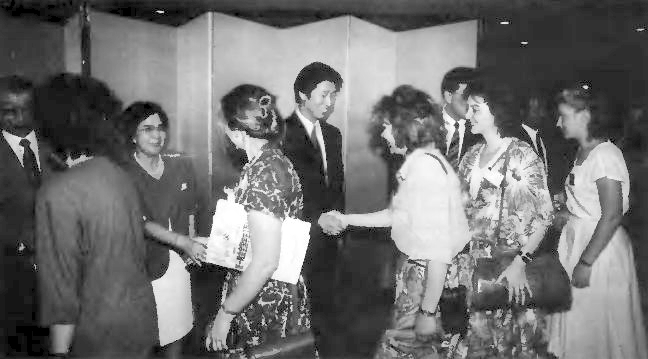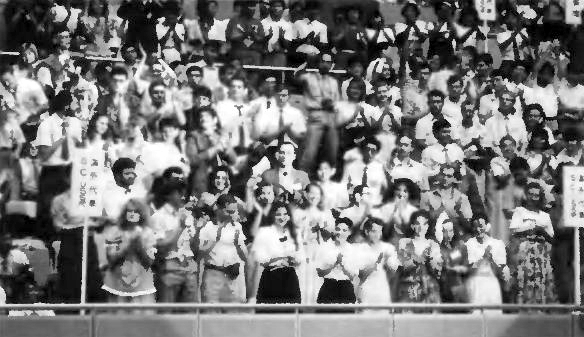![]()
The Words of Hyo Jin Moon
|
|
The Words of Hyo Jin Moon |

Hyo
Jin Nim and Yuri Zaithev, president of the Soviet Union All Students'
Council, receive bouquets at the welcoming banquet
I am very pleased to have this opportunity to welcome you to Japan. I hope that through this experience we can transcend national boundaries to better understand one another. I want this opportunity to be productive for all of you, since you are here looking for interaction.
I know we can interest you in certain ideas that you will be able to use in whatever way you choose. We are going to clearly explain what we believe; this time is solely for you to make decisions based on your observation and your personal experience while you are here.
We are all heading toward the 21st century. We can no longer practice a policy of isolation or just dwell on exclusive, nationalistic programs; those ideas belong to the past. Our goal for the 21st century is to understand how can we create a world where there is no discrimination based on creed, color or nationality. But a world where we can all live harmoniously, not just idealistically but in reality.
I believe everyone in this room has wonderful and unique characteristics. The ideal world should be a place where all these differences and abilities can benefit the well-being of the whole. That is the wonder and beauty of our existence. When we look at the creation, we want to see diversity. How to enable these many different people to live together harmoniously is the question; that is the work we are trying to tackle and ultimately resolve.
In marriage, two individuals who are totally different come together to consummate love, because man and woman need each other. By the same token, we are different: you are Russian students, this is Japan and I am Korean. The basis of Reverend Moon's teaching is friendship: that is, to love people and yourself for the sake of something greater than yourself. It is a simple truth. We don't just dwell in a concept, but try to actually put it into practice. This is the hardest part. Constructing the basics is a fundamental step to success but it is also the most difficult step that one can take in life.
I hope you can truly use this time wisely. It is your time. You are here to learn new things. It is your opportunity to observe, experience and touch many of the young people who are here representing the Unification Church.
I welcome you and hope you have the greatest experience in your life through this workshop. So take us into your heart and we'll try to take you into our heart. God bless you!

Hyo
Jin Nim gives a heartfelt welcome to each of the Soviet students
Since the Twelfth World Media Conference held in Moscow, communication between members of the Unification Church and people in the Soviet Union has suddenly become very active. The Japanese-Soviet Students Good Will Seminar was held as part of that growing exchange. Japan CARP invited the Soviet Union All Students' Council to attend the National Students' Rally on July 22 and then participate in a Divine Principle workshop. The Soviet Union All Students' Council was established to promote perestroika. Their visit to Japan is fruit of the Media Conference held in Moscow earlier this year.
After attending the National Students' Rally held at the Makuhari Messe in Chiba prefecture, a welcome banquet was given at the Makuhari Prince Hotel, sponsored by Hyo Jin Nim, president of World CARP.
Yuri Zaithev, president of the council, made a speech of gratitude:
We have come from a country far but near. When we stepped onto this land for the first time, we had a nice impression of Japan. As we talked with our sponsors, our impressions have deepened.
We have come to Japan to learn as much as possible. I believe we should learn to the end of our lives. There has been a tradition in Russia: when we have a conversation, we must 'understand each other from the bottom of our heart.'
We are sincerely grateful to the Unification Church members and Rev. Sun Myung Moon for being given an opportunity to visit Japan.
The Soviet students attracted much attention both inside and outside the Church. The media gathered data about the students, with TBS Broadcasting putting them on the air on July 23. Beginning the following day, Soviet students studied the Divine Principle, visited newspaper publishing companies such as Yomouri and Asahi, toured a Japanese broadcasting corporation and the Unification Church Headquarters.
From July 23 -- 28, the Japanese-Soviet Student Good Will Seminar was held at the Miyazakidai Training Center run by the Unification Church in Kanagawa prefecture. These students were the elite of the Soviet Union. They widened their understandings by visiting political, economic, technological and media organizations as well as a temple and a shrine.
On July 26, Iwaro Takahashi testified to his experience in the Unification Church. He outlined the Divine Principle and explained Father's thought and the vision of the Unification Movement. He also referred to prominent Russian literature which suggests that the Russian people are religiously inclined.
Though religious activities were prohibited before perestroika in the Soviet Union, there are many who have kept their faith at home. Christian literature has been secretly read. There were atheists among the Russian students, but most found something even beyond the religious dimension in the Unification Movement.

Soviet
students rise and applaud in acknowledgement of their attendance at
the Japanese CARP rally
The Russian students admitted that the Soviet government commanded the creation of a special education system for the gifted, but felt that such an education system "is wrong". This showed that the spirit of the students is to promote perestroika. Although they are proud of the culture and history of their country, they make a clear stand against communism.
They expressed such frankness and simplicity, bringing gifts from the Soviet Union -- pins, dolls called "matroshka", and many folk-art wooden spoons. Every time they met someone, they gave them a spoon. Being outspoken seems to be characteristic of Russian people, as evidenced through their clear opinions. In addition, they made friends with local high school students by pleasantly chatting with them outside the Center. The staff was surprised and touched by their behavior.
Through this seminar, the young people of Japan and the Soviet Union, once far apart internally, could grow to love each other from the bottom of their hearts. This proves the possibility of realizing mankind's ideal of world harmony and unity.
On July 27, two days before their departure, a Japan-Soviet Union Sisterhood ceremony was held. This sisterhood will contribute to the realization of an ideal world by deepening mutual friendship among students, promoting the mutual cooperation and good will between the two countries, and helping students accept their responsibility as contributors to the family of nations.
The students from both countries signed written pledges and exchanged each other's addresses, promising to continue future communication.
On July 28, they paid a courtesy visit to the Tokyo Church. The Unification Church members welcomed them, waving the flags of both countries. Their student leader, Mr. Zaithev said, "I was deeply moved by the warm clapping of hands and smiles of the members. Perestroika has brought us such an encounter. I would like to move ahead in the future by deepening our mutual understandings." The Soviet students began their journey home with many unforgettable memories.